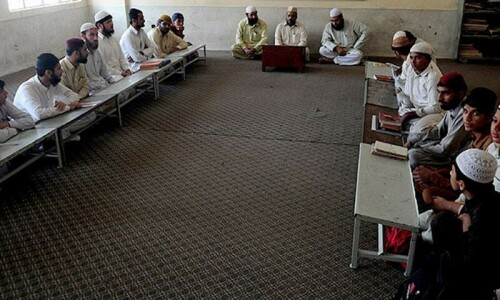ISLAMABAD: The Election Commission of Pakistan (ECP) is set to appoint on Monday (today) the district returning officers (DROs) and returning officers (ROs) for the general elections slated to be held either in the last week of July or the first week of August.
A senior ECP official said all the DROs and ROs would be drawn from the subordinate judiciary in line with a decision taken by the commission in March.
The training of master trainers, who would be selected from among the DROs and ROs, would begin immediately after their appointment, he added.
All election officers will take oath to abide by law and Constitution
The official said that under Section 59(1) of the Elections Act 2017, the ECP would provide the proposed list of polling stations for each constituency to the returning officer concerned within a week of his or her appointment.
The list, which would be published on the ECP’s website, would show the areas assigned to each polling station.
For the first time, he said, all election officials before commencement of their duties would take an oath to work strictly in accordance with the provisions of the elections act and rules and directions given in the Constitution.
He also referred to section 55 of the act, which reads: “An election official appointed or deputed to perform duties in connection with an election shall be deemed to be under the control, superintendence and discipline of the Commission for the period commencing on and from the date of appointment or deputation till publication of the name of the returned candidate in the official Gazette.”
He said sub-section 2 of section 55 empowered the ECP to initiate and finalise disciplinary action and impose any penalty on any election official for any act of misconduct provided in the Efficiency and Discipline Rules as applicable to such official or under any provision in the elections act. For this purpose the commission shall be deemed to be the competent authority under the said rules or the elections act.
The National Judicial Policy Making Committee (NJPMC), in its policy of 2009, had decided to stop judicial officers from performing election duties.
A request for assistance of judicial officers for the 2013 general elections was rejected by the committee when retired Justice Hamid Ali Mirza was the chief election commissioner, but a similar request made by his successor retired Justice Fakhruddin G. Ebrahim in 2012 was accepted as the NJPMC agreed to a one-time lifting of the bar on the judiciary’s involvement in the electoral process.
The committee, which met with then chief justice of Pakistan Iftikhar Muhammad Chaudhry in the chair, decided to provide services of an adequate number of judicial officers to the ECP for their appointment as DROs and ROs.
It observed that because the administration of justice was the prime responsibility of the judiciary, judicial officers appointed as returning officers should focus on their routine work and perform election duties in extra hours in the morning and evening so that litigants did not suffer.
In his introductory remarks at the meeting, the-then chief justice said the past involvement of the judiciary in election process had adversely affected the judicial work. That’s why a bar on the appointment of judicial officers as election officials had been imposed.
Published in Dawn, May 7th, 2018















































Dear visitor, the comments section is undergoing an overhaul and will return soon.